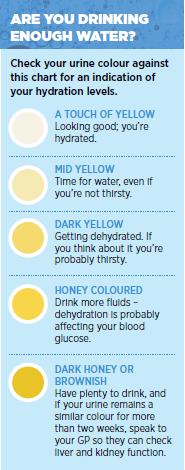Summer Hydration Guide
For those who live with any form of diabetes, staying hydrated is extra important. Dietitian Helen Gibbs has some tips.
With diabetes, there can be days where you’re active, you eat well and you take whatever treatment you need, and yet your blood sugar levels still run high.
The missing piece of the puzzle may well be changes in your hydration level, especially if you notice this happening more on warm days.
How dehydrated am I?
Dehydration is often measured as a percentage of body weight. If you’re 1% dehydrated, that means you need to top up with an amount of water that’s equal to 1% of your body weight.
For example, someone weighing 75kg who is 1% dehydrated needs an extra 750ml of water. Someone weighing 100kg who is 1% dehydrated needs an extra litre (1,000ml) of water.
Even when we’re only 1% dehydrated, our body function is altered. This level of dehydration can cause increased anxiety and reduce the ability to think clearly. For people with diabetes, there’s an added problem. Dehydration pushes up blood sugar. When your blood sugar goes up, you pee more, which leaves you even more dehydrated.
The trouble is, humans often don’t know if we need water. Our thirst mechanism only kicks in when we’re about 2% dehydrated, so if we simply follow our thirst, we could be becoming dehydrated before we realise.
How do I know if I’m dehydrated?
Urine colour is the best measure. The advice is that urine should be “light straw colour”. The colour shown in the diagram is close to the colour your urine should be.
How much water do I need?
The amount of water you need depends on your size, how active you are, and how hot the environment is.
The rule of thumb of eight glasses a day (2 litres) is a good starting point, but you may find you need more or less than that.
Many people find that if they suddenly increase the amount of fluids they take in, they start to need the toilet more. This usually settles down after three or four days, so keep persisting and you’ll find it gets easier as your body gets used to holding more dilute urine.
What should I drink?
Water is the best choice but not the only choice. Tea, coffee, herbal tea and soup are all sources of fluid. For people who want to drink soft drinks, having diet drinks is okay occasionally. Juice, smoothies and other sugary drinks will increase your blood sugar, so are not ideal.
Sometimes getting kids to drink enough fluids can be tricky. Making sugar-free ice cubes and ice lollies is a great way to encourage more intake.
It’s important to remember that alcohol is dehydrating. If you plan to drink alcohol, make sure you’re hydrated before you start. When I speak to sportspeople, I recommend non-alcoholic drinks until they start passing pale urine. Or “don’t get pissed until you piss”.
Here’s wishing everyone a happy, healthy, well-hydrated summer!

